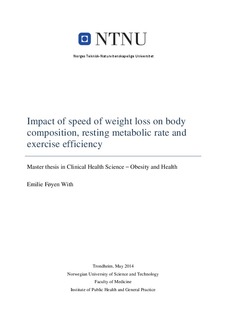| dc.description.abstract | Background: There is a common belief that losing weight fast leads to a greater loss of fat
free mass (FFM) and larger reduction in resting metabolic rate (RMR) compared with more
gradual weight reduction. Unfortunately, well-designed studies in this area are lacking.
Purpose: The primary aim of this study was to determine if a similar weight loss (WL)
achieved fast versus gradually induces the same changes in body composition, more
specifically regarding the loss of FFM. Secondary aims were to assess if speed of WL has an
impact on RMR and exercise efficiency (ExEff).
Material and method: 35 sedentary, healthy obese (BMI ≥30kg/m
2
) adults (18-55 year old)
were randomized to lose 9-10 % of their baseline weight rapidly (very low-calorie diet
(VLCD) for 4 weeks) or gradually (low-calorie diet (LCD) for 8 weeks). Body composition
(fat mass (FM) and FFM), RMR, respiratory quotient (RQ) and ExEff (at 10, 25 and 50W)
were measured before and after the intervention.
Results: A significant reduction in body weight (ca. -9%), FM (kg and %) FFM (kg) and RQ
and an increase in FFM (%) were observed over time, with no significant differences between
groups. A significant reduction in RMR was observed in the fast WL group (-129±118,
P<0.0001, but not in the gradual WL group (-24±136, P<0.05), and difference between groups
were significant (P<0.05), even after adjusting for loss of FFM and RMR at baseline
(P<0.01). A larger increase in ExEff at 10 and 25 W was observed in the rapid compared
with the gradual WL group (P<0.01), and the difference were still evident after adjusting for
absolute WL and ExEff at baseline (P<0.01).
Conclusion: This study does not support the general belief that rapid WL leads to a larger
loss of FFM, but rapid WL seems to lead to a larger reduction in RMR, as well as a greater
increase in ExEff at low intensity levels and a greater decrease in RQ (increase in fat
oxidation). However, further research is needed in this area.
Relevance
Obesity is an increasing problem worldwide, and it is, therefore, necessary to identify
appropriate treatments, which can induce the best results in terms of long-term WL
maintenance. This study will provide evidence regarding the speed of WL associated with the
most favorable modifications in body composition, skeletal muscle efficiency and RMR.
Changes in these variables are most likely to modulate long-term maintenance of a reduced
body weight (BW). | nb_NO |
